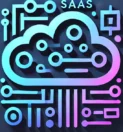Explore how Elon Musk and Satya Nadella’s AI strategies shape U.S. tech, jobs, and innovation in an intensifying rivalry between visionaries.
Introduction
Imagine two powerhouses at the helm of America’s AI revolution—one, a risk-taking disruptor; the other, a strategic corporate transformer. Elon Musk vs Satya Nadella: AI Power Play Intensifies pits bold ambition against steady mastery. Whether you’re tracking the latest moves at Tesla, OpenAI, or Microsoft, or you’re curious how this duel shapes innovation and jobs across the U.S., you’re in for a deep dive that feels like a caffeine-charged conversation with a tech-savvy friend.
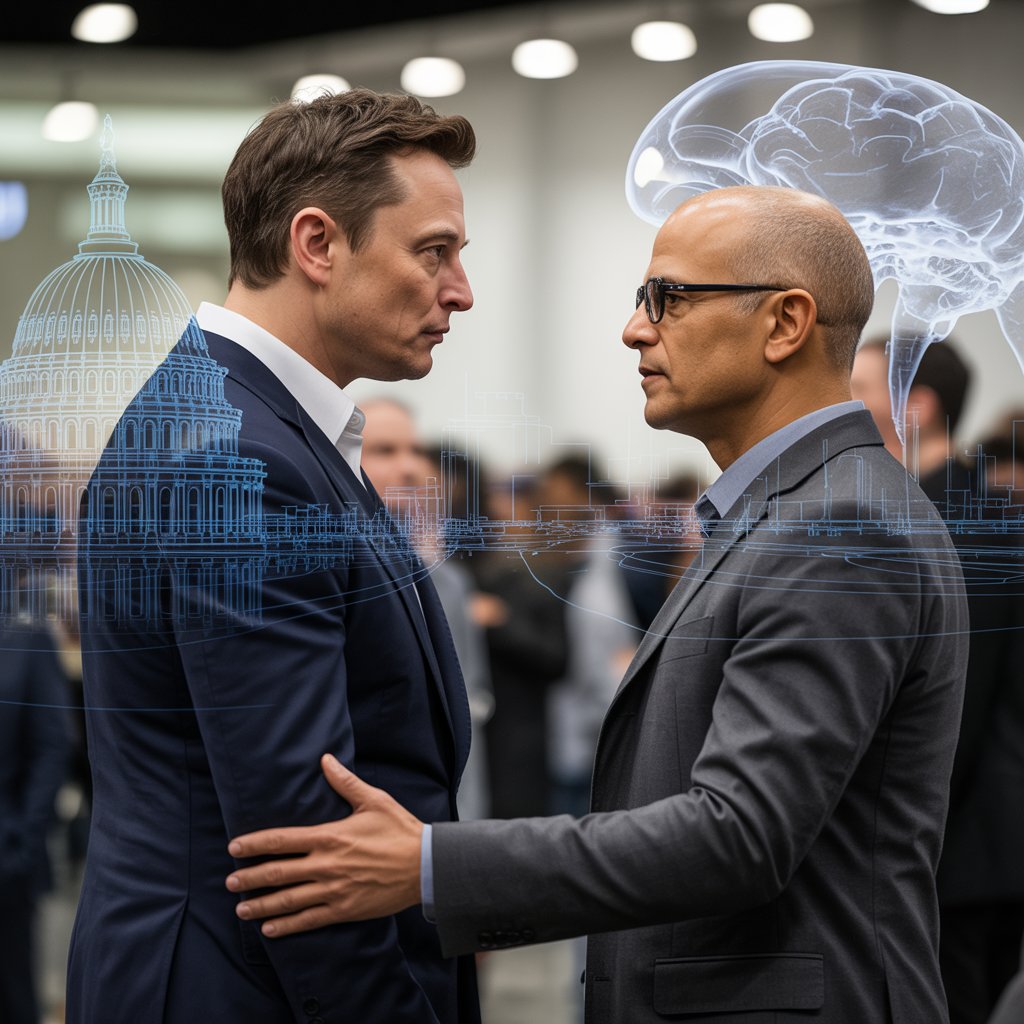
In this article, we dig into their distinct AI strategies, the ripple effects on American industries and talent, and why this rivalry matters—right now, in the heart of U.S. technological leadership.
Elon Musk vs Satya Nadella: AI Power Play Intensifies
The Contenders – A Quick Profile
Elon Musk: The Visionary Disruptor
Elon Musk, known for his relentless drive, has positioned himself at the cutting edge of AI through ventures like Tesla, Neuralink, and his foundational role at OpenAI. His approach often reflects bold, sometimes controversial pronouncements—think “full autonomy by this year,” or Neuralink’s brain-machine symphonies. To Musk, AI is both an existential risk and a gateway to the next leap of human evolution.
Satya Nadella: The Strategic Transformer
On the flip side stands Satya Nadella, Microsoft’s CEO who revitalized the company with measured AI integration into products like Azure, Microsoft 365 Copilot, and GitHub Copilot. Nadella emphasizes enterprise trust, regulation-ready infrastructure, and wide adoption. His leadership feels more like chess—careful positioning, deliberate moves, and ecosystem building.
Strategic Moves and Company Playbooks
OpenAI, Tesla & Beyond – Musk’s Moves
- OpenAI’s Evolution
Though Musk was instrumental in its founding, he’s taken a step back. Still, his early vision—safe, broadly beneficial AGI—lingers in OpenAI’s DNA. The publication of GPTs and DALL·E has sparked widespread innovation, even if Musk more recently criticizes some of its directions. - Tesla’s AI Frontier
Musk continues to drive AI through Tesla’s electric-vehicle autonomy efforts. Real-world data from millions of miles driven powers self-driving advances. His bold predictions—full autonomy by this year—stir headlines, whether realized or not. - Neuralink and AI-Human Fusion
Neuralink seeks to integrate AI with the human brain. While still experimental and highly controversial, it signals Musk’s ambition to blur lines between mind and machine.
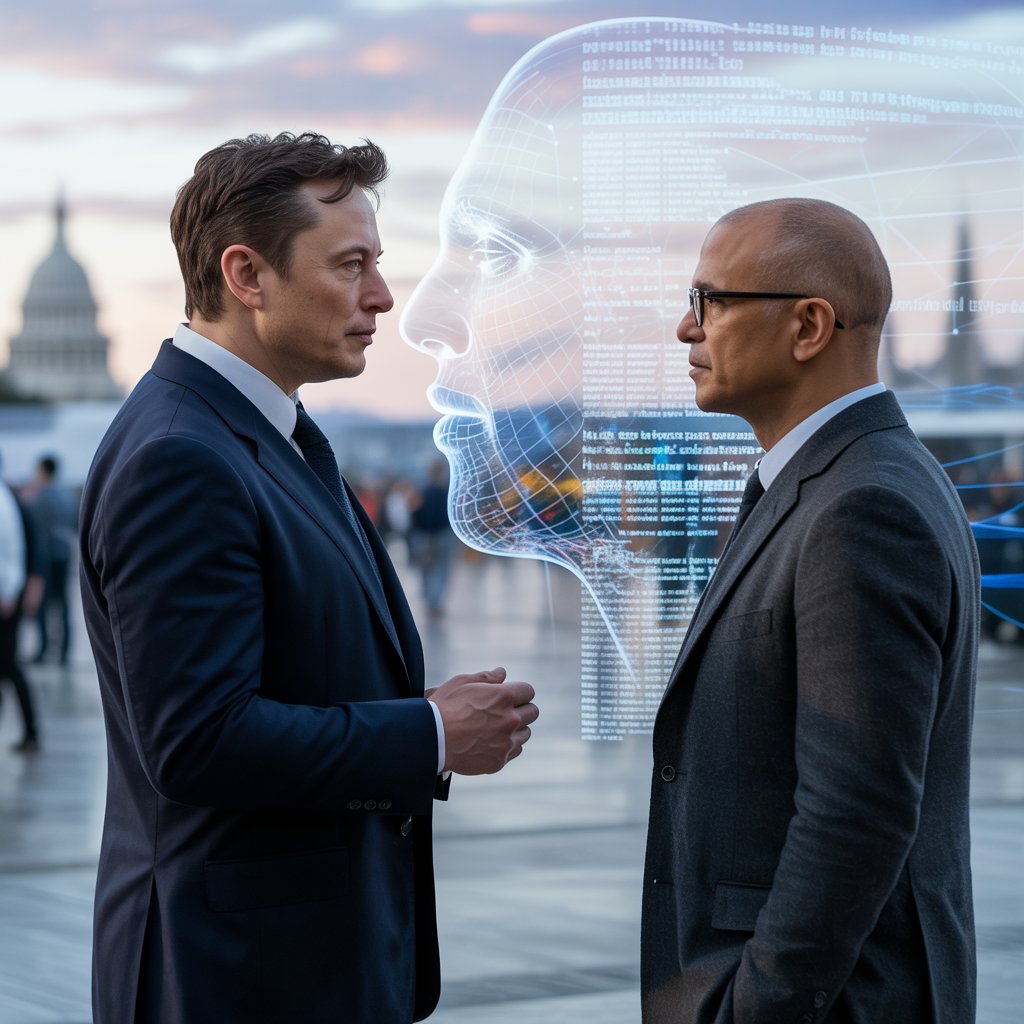
Microsoft’s AI Expansion under Nadella
- Azure AI and Infrastructure Dominance
Microsoft has architected Azure as a ready-made backbone for AI developers—with scalable compute, enterprise security, and regulatory compliance baked in. - Copilot Ecosystem
With AI copilots in Word, Excel, GitHub, and other productivity tools, Microsoft isn’t chasing hype—it’s delivering AI that millions of U.S. workers use every day. That’s a powerful route to widespread adoption and cultural change. - Partnerships & Regulation Integration
Nadella’s Microsoft partners with OpenAI, offers AI ethics frameworks, and works with regulators—positioning itself as both a builder and a responsible corporate citizen.
Competitive Advantages—What Each Leader Brings to the Table
Musk’s Boldness & Talent Magnetism
- Media Dominance: Musk knows how to generate global attention—tweets go viral, announcements spark debates aged-in-seconds.
- Talent & Culture: His ventures attract top engineers and visionary minds eager for high-risk, high-reward challenges.
- Frontier Flexibility: Musk’s smaller, agile structures enable rapid pivots across sectors—from rockets to robots.
Nadella’s Discipline & Enterprise Reach
- Distribution Power: Microsoft’s tens of thousands of enterprise clients in the U.S. make AI integration a matter of course.
- Financial Stability: With a broad revenue base and steady profits, Microsoft can invest heavily in safe, long-term AI capabilities.
- Trust & Governance: For government, healthcare, finance—industries wary of AI—Microsoft offers compliance and enterprise-grade oversight.
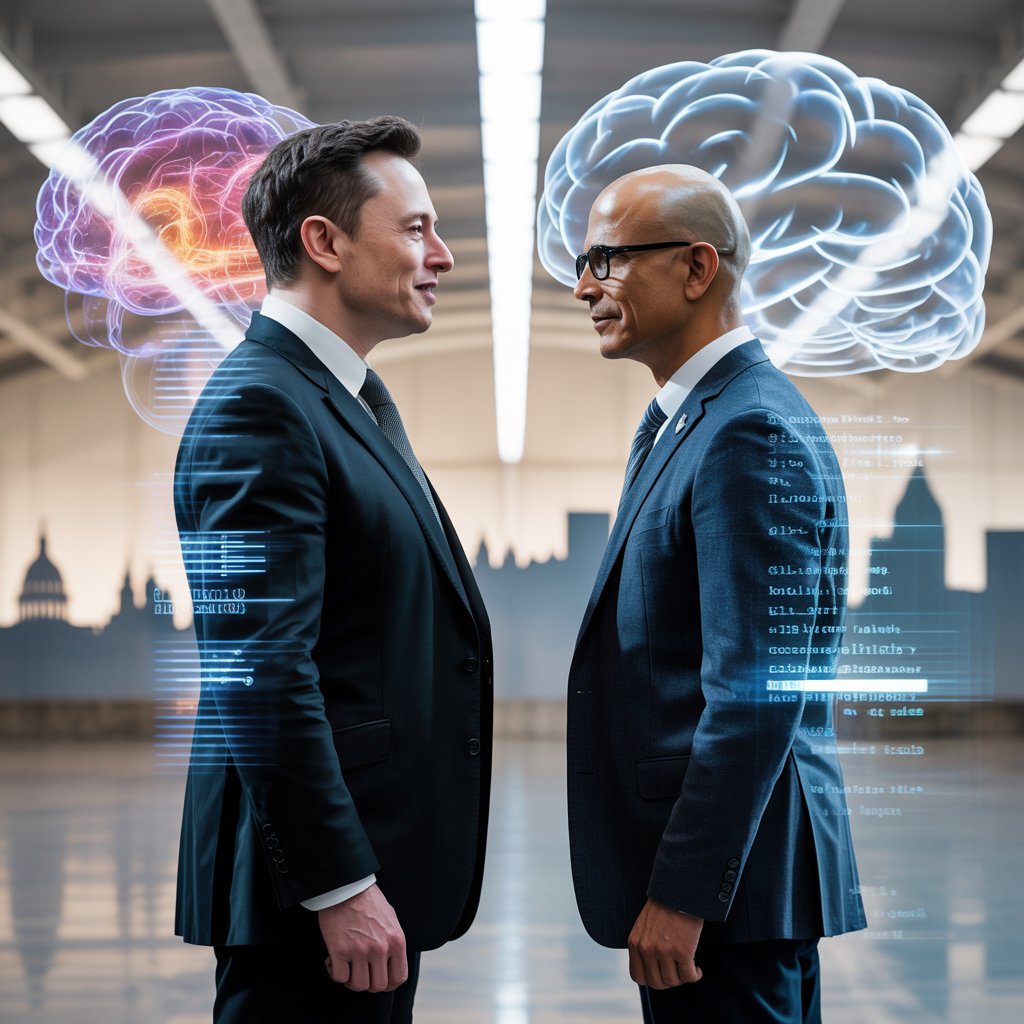
U.S. Tech, Jobs, and Innovation—The Big Impact
Job Market Shifts in the AI Economy
- New Roles & Reskilling: Musk-style innovation spurs jobs in robotics, data engineering, autonomy, and even brain-computer research. Microsoft-style integration drives roles in AI-augmented productivity, cloud engineering, AI governance, and digital transformation.
- Reskilling Imperatives: American professionals—from programmers to office workers—must adapt, learning tools like Copilot or autonomous-tool development.
- Regional Ripples: Silicon Valley and Redmond remain core AI hubs, but emerging tech regions (Austin, Raleigh, Pittsburgh) gain attraction as AI spills out across the U.S.
Innovation Ecosystem & U.S. Leadership
- Frontier vs Enterprise: Musk’s “frontier AI” fosters breakthrough experimentation, while Nadella’s enterprise strategy cements commercial AI into business infrastructure.
- Open vs Closed Models: OpenAI started with a more “open” publishing stance; Microsoft leans toward proprietary but ethically governed rollouts. The tension between open innovation and enterprise control plays out across the entire ecosystem.
- Regulatory Shaping: The U.S. must decide: which path shapes its ethical AI policy? Musk’s bold experimentation or Nadella’s measured rollout? Whichever approach prevails affects how AI develops in U.S. courts, classrooms, and boardrooms.
Real-World U.S. Examples & Case Studies
Tesla Autopilot Trials and U.S. Roads
Autopilot and FSD beta testing across U.S. roads generate daily headlines. Musk’s aggressive self-driving push tests legal boundaries, insurance models, and consumer trust—driving real regulatory debates at state levels.
Microsoft 365 Copilot at American Workplaces
From Fortune 500 banks to state government offices, Copilot quietly changes how Americans work—from writing reports to analyzing data. Its uptake paints a picture of AI as a workplace co-worker, not a distant sci-fi threat.
AI Ethics & American Regulation
Musk’s vocal warnings about AI risk resonate in U.S. policy circles, scattering think-tank conferences with urgency. Meanwhile, Microsoft’s frameworks win nods from policymakers—a contrast shaping national preparedness.
Head-to-Head Comparison Table
| Dimension | Elon Musk | Satya Nadella / Microsoft |
|---|---|---|
| Strategic Style | Disruptive, media-driven, frontier | Incremental, enterprise-focused, governance-aware |
| AI Highlights | Tesla autonomy, Neuralink, OpenAI roots | Azure AI, Copilot, enterprise adoption |
| Strengths | Bold vision, agility, talent draws | Distribution scale, trust, financial muscle |
| U.S. Impact | Regulatory stirrings, tech hub excitement | Workforce AI integration, business productivity |
| Long-term Trajectory | Risky experimentation, potential breakthroughs | Built-in productivity, broad systemic change |
What the Future Holds for U.S. Tech
Innovation Synchronicity or Collision?
Will Musk’s breakthroughs and Nadella’s enterprise rollouts work in sync? Imagine a U.S. where Neuralink’s brain-AI interfaces are built on Azure’s regulated cloud, or where Tesla autonomy joins Microsoft-powered logistics systems. Alternatively, diverging approaches could lead to fragmented AI standards—some bold and open, others closed but safe.
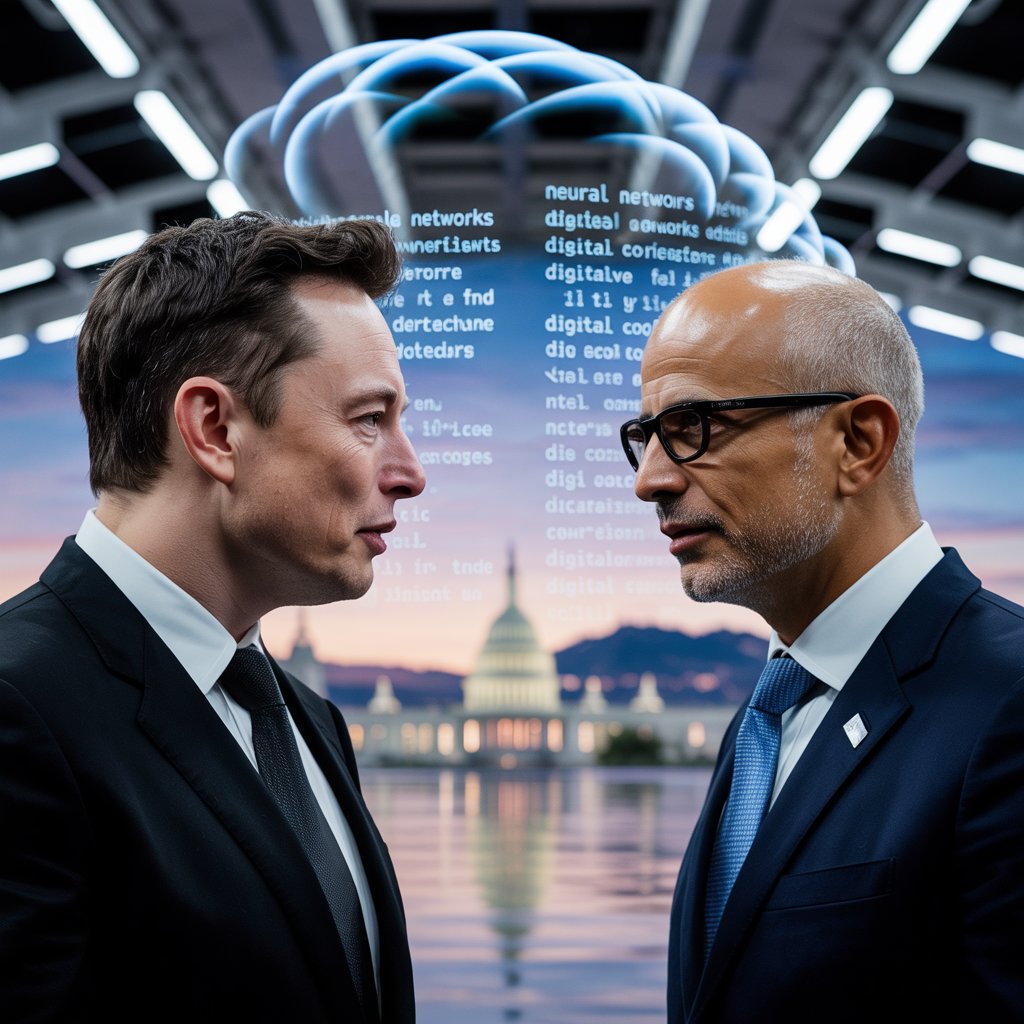
Policy and Public Opinion
In coming years, U.S. public opinion and policymakers will weigh between Musk’s cautionary red flags and Nadella’s assurances. The outcome affects AI governance: do we lean toward “pause and regulate,” or “scale and standardize”?
Workforce Flows and American Resilience
The evolving rivalry shapes where AI talent flows—into nimble startups or enterprise programs. U.S. success hinges on its ability to train, educate, and scale talent across both models, ensuring supply matches future demand.
Conclusion: The U.S. Stakes in This AI Power Play
Wrestling between Elon Musk’s bold disruptions and Satya Nadella’s strategic stability isn’t just headline fodder—it’s a defining narrative of how American AI evolves. Musk pushes the frontier; Nadella builds the foundation. Together, they are co-authors of U.S. AI policy, workforce transformation, and technological destiny.
For U.S. readers—entrepreneurs, policy watchers, job seekers, students—this rivalry matters. It informs what skills you’ll need, which companies will lead, and what values guide AI’s role in everyday life. Keep watching: whether in bold leaps or quiet integration, the Musk-Nadella duel is steering the next chapter of America’s tech story.
